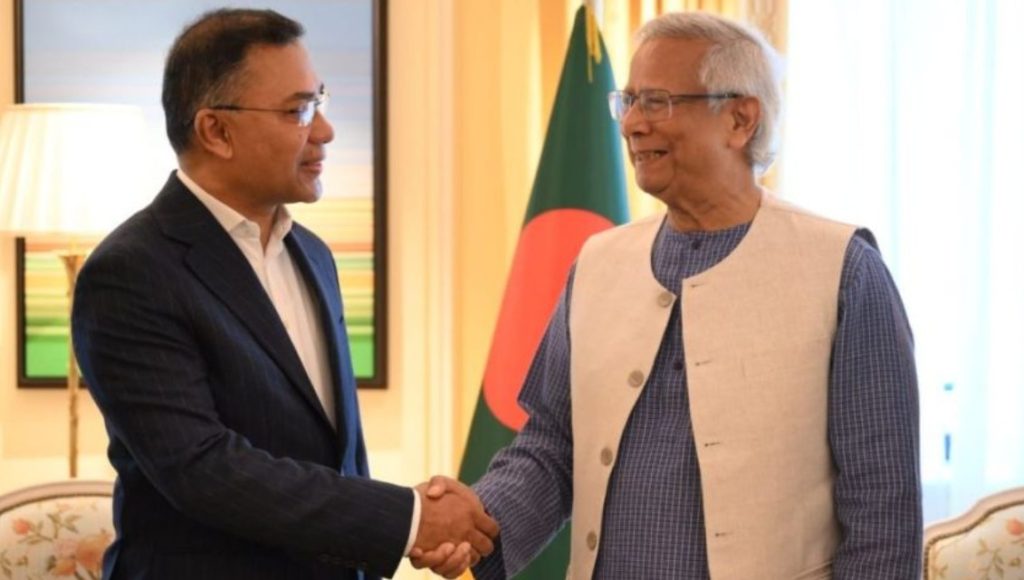Following more than a week of apparent political calm, Bangladesh’s domestic political landscape is once again abuzz with activity. Political parties are now sketching their strategies for the next national election, while state authorities begin preparations to ensure a smooth and credible electoral process in early 2026.
The target timeline has now shifted to February, as a significant breakthrough was reached in a recent London meeting between interim government chief adviser Muhammad Yunus and Tarique Rahman, the de facto leader of the Bangladesh Nationalist Party (BNP).
In that meeting, the two reportedly reached a conditional agreement to hold the national election before the holy month of Ramadan in 2026.
Yunus agreed to move the voting timeline forward to February, accommodating Tarique’s proposal, despite having earlier announced an April schedule in a televised national address on June 6.
Although several political parties in Bangladesh have expressed dissatisfaction over being left out of this pivotal dialogue, they have nonetheless begun recalibrating their election strategies.
The BNP, currently led by Tarique Rahman in the place of his ailing mother and former prime minister Khaleda Zia, has welcomed the outcome of the London meeting.
However, the party’s long-standing ally, Bangladesh Jamaat-e-Islami, has voiced disappointment over being sidelined.
Similarly, the National Citizen Party (NCP), a newly formed political platform born out of last year’s student-led uprising that toppled former Prime Minister Sheikh Hasina, is also displeased with Yunus’ unilateral decision to revise the election timeline without broader consultation.
Meanwhile, Hasina’s Awami League remains banned under the current interim administration and is largely absent from discussions surrounding the upcoming election.

Within BNP ranks, there is growing anticipation and a sense of inevitability regarding Tarique Rahman’s return to lead the party into the election. Tarique has been living in exile in London since the 2007 political changeover.
Amid ongoing debate, Chief Election Commissioner AMM Nasir Uddin stated on Sunday that the commission would maintain strict neutrality in the upcoming polls.
“We will act as a referee. Whoever wants to participate, can. Whoever wins, must win fairly. Our job is to ensure a level playing field for all,” he said during a post-Eid address to officials at the EC Secretariat in Agargaon, Dhaka.
On the same day, Home Affairs Adviser Jahangir Alam Chowdhury assured the public that law enforcement agencies are fully prepared to maintain order once the election schedule is formally announced.
Commenting on the Yunus-Tarique meeting, rights activist and an adviser to the interim administration Syeda Rizwana Hasan said the development was reassuring, as political parties are now re-engaging with the electoral process.
“If parties have anything to say, they will convey it to the Chief Adviser. The ongoing dialogue on political reforms and elections is a positive signal.”
As political momentum builds, the National Consensus Commission is set to resume its second round of reform dialogue with political parties on June 17.
The dialogue is scheduled to be held at the Foreign Service Academy at 11:00 am, according to an official press release.
Key items on the agenda include unresolved discussions around Article 70 of the Constitution, the process for selecting parliamentary standing committee chairs, and the enhancement of women’s representation in parliament.
Two new topics — consideration of a bicameral legislature and the appointment process for the Chief Justice — will also be introduced.
BNP Standing Committee Member Khandaker Mosharraf Hossain described the London meeting as “crucial for Bangladesh and its future.”
He added, “It reduced uncertainty and opened the path for peaceful elections. Many were unsure if polls would even take place. But now, that path is clear. Reforms and trials may continue, but they won’t derail the election.”
Standing Committee Member Salahuddin Ahmed echoed similar sentiments, calling the meeting “historic” and “a victory for democracy.”
He emphasised that the people of Bangladesh have long awaited a fair and credible election and that goal now appears within reach.
“A free and fair election will pave the way for a strong democratic government and lasting political stability.”
Salahuddin also praised both Yunus and Tarique Rahman for demonstrating political maturity and pragmatism.
“They agreed on the February election timeline after carefully considering all critical factors,” he said, noting that the dialogue focused not just on present concerns but also on the long-term future of the nation.


